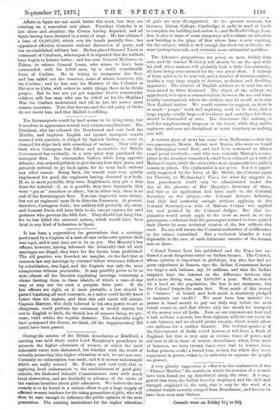Colonel Nassau Lees has published and the Times has en-
dorsed a most dangerous letter on Indian finance. The Colonel, whose opinion is important in philology, but who has had no great experience in finance, says the Indian Government keeps too large a cash balance, say 18 millions, and that- the Indian taxpayer loses the interest on the difference between that and a more fitting sum, say £400,000 a year. Well, as that is 2d. a head on the population, the loss is not enormous, but the Colonel forgets the main fact. How much of this money is " balance " or hoard, and how much is absolutely pledged to maintain our credit? We must have four months' ex- penses in hand merely to pay our daily way before the next rental comes in, and that allows only one month for transport of the money over all India. Now, as our expenses are four and a half millions a month, less than eighteen millions can never be a safe balance, and we should prefer twenty, which would allow two millions for a sudden disaster. The Colonel speaks as if the Government of India could borrow at will from a Bank of England, but that is true only at certain times of peace, and not true at all in times of serious disturbance, when, from want of balances, we have twenty times over had to borrow from Indian princes,—take a forced loan, in fact, for which they want repayment in power,—that is, in authority to squeeze the people we protect.


































 Previous page
Previous page